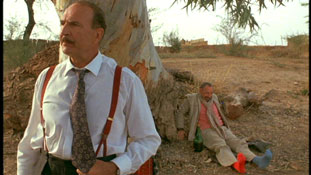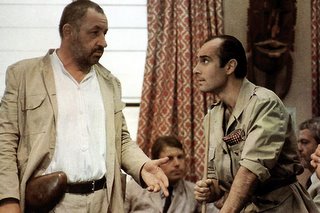 Coup de Torchon (Clean Slate) (1981)
Coup de Torchon (Clean Slate) (1981)Director: Bertrand Tavernier
Bertrand Tavernier, one of my favorite directors, has a particular talent for examining men and their work. In such films as 'Round Midnight, Ça Commence Aujourd'hui (It All Starts Today), and L.627, Tavernier looks at a musician, a school teacher, and a narcotics cop, respectively, and their obsessive devotion to their work. Few filmmakers approach the workplace with such a complete sense of how much a man and his occupation fuse into one inseparable entity. His appreciation of this phenomenon helps one understand how a man can drop dead the day after retirement.
Coup de Torchon seems, at first, to be the antithesis of this theme. However, if we look at what its protagonist, Lucien Cordier (Philippe Noiret, best known to Americans as the projectionist in Cinema Paradiso), says about his work as the sheriff of a small town in French West Africa, we can see that being thwarted in performing his duties may be a major problem for him. This possibility only becomes apparent after the plot thickens.
Bourkassa is a godforsaken nothing of a town that is populated by failures and run by the only man to have come there and made good--and in only two years--a fellow (possibly not even French) named Vanderbrouck (Michel Beaune). Cordier has spent 15 years in this backwater, and spends his days arguing with Vanderbrouck about the placement of a roofless communal latrine directly under his apartment's balcony, trying to get his wife Huguette (Stéphane Audran) to have sex with him, and most important, avoiding having to perform his official duties. "Doing nothing is my job," says Cordier. "I'm paid for it."
Because he appears to be a useless man in a useless town, Cordier is the butt of ridicule by his wife, who rejects his advances to engage in a possibly incestuous relationship with her infantile brother Nono (Eddie Mitchell), two pimps who run the local brothel, and his district commander Chavasson (Guy Marchand). His only pleasures seem to be sex with Rose (Isabelle Huppert) the battered wife of one of the locals and large tumblers of absinthe shared with his only prisoner/servant, Fete Nat (Abdoulaye Diop). Cordier seems the essence of the man who goes along to get along.
One day, he sees the two pimps shooting at the corpses of Africans set adrift in a river as the traditional form of burial. He threatens to arrest them for desecrating graves. They offer him a bribe of 50 francs, which he accepts. Then they shove him in the river and throw the money in after him. Although he resignedly picks up the franc note and climbs out of the
 water, this humiliation and his apparent sense of offense at how they regard black Africans sends him to see Chavasson. Chavasson gives him a lesson in how to deal with bullies. When they kick, he says, kick back twice as hard. He illustrates this point by kicking Cordier twice through his office doors, to the amusement of some Africans sitting on a bench in the corridor. Chavasson has his new flunky escort Cordier to the train, where Cordier seeks his assurance that Chavasson has him covered. What this means dawns on us and Chavasson in due time.
water, this humiliation and his apparent sense of offense at how they regard black Africans sends him to see Chavasson. Chavasson gives him a lesson in how to deal with bullies. When they kick, he says, kick back twice as hard. He illustrates this point by kicking Cordier twice through his office doors, to the amusement of some Africans sitting on a bench in the corridor. Chavasson has his new flunky escort Cordier to the train, where Cordier seeks his assurance that Chavasson has him covered. What this means dawns on us and Chavasson in due time.On the train back to Bourkassa, he meets an attractive French woman named Anne (Irène Skobline). He asks her what she is doing in the country. She replies, "I'm the new schoolteacher of Bourkassa." Strangely stung by her answer, he counters, "That's a fine profession. A vocation, I'd say. Thanks to you, black children will be able to read their daddy's name on French war memorials." We are reminded of how useless he is to his own vocation.
Back in Bourkassa, he escorts Anne to her quarters. He is wearing a sidearm. He asks if it frightens her. She says no. But it causes us some discomfort. We haven't seen him wear it before. Perhaps it was just because he went to see Chavasson, something official he had to do to play the game. Indeed the latter may be true, because even though he uses it to kill the pimps when he encounters them by the river, he says later that he doesn't plan things out. They just occur. It's hard not to believe him, even after he finds a way to pin the murders on Chavasson. These two murders seem to be the emotional culmination of his humiliating, useless existence.
If the first murders are happenstance, the rest are somewhat plotted. Cordier pretends he's finally performing his public duty by putting these tortured souls--for isn't all humanity tortured?--to rest. He starts telling people he's Jesus Christ. What he is and what will become of him is an open question. I don't think it is giving anything away to say that the last scene has him aiming his pistol at some African children, then hesitating to shoot. Cordier is a man we both revile and pity, a lunatic louse with some shred of humanity that torments him at all times.
This movie was based on a novel, Pop. 1280, by Jim Thompson. I haven't read the book, but reader reviews of it call it hilarious and the blackest of Thompson's many cynical musings on small town living. Despite what my description implies, this movie is extremely funny. But the murders are not, even when they could be filmed in something of a burlesque. This did not hurt the film, in my opinion. It was the uneven performance of Noiret that had me
 confused and ultimately unsold on the character of Cordier. Rose's almost nymphomaniacal attraction to him is incomprehensible, though he tells her at one point that she is well suited to being a prostitute (perhaps because her standards are so low?). Noiret also does too good a job of covering up how smart Cordier really is. The change is far too jarring. Although Cordier suggested to me the character of Tom Ripley, the psychopathic killer created by novelist Patricia Highsmith, he just didn't seem as fully fleshed.
confused and ultimately unsold on the character of Cordier. Rose's almost nymphomaniacal attraction to him is incomprehensible, though he tells her at one point that she is well suited to being a prostitute (perhaps because her standards are so low?). Noiret also does too good a job of covering up how smart Cordier really is. The change is far too jarring. Although Cordier suggested to me the character of Tom Ripley, the psychopathic killer created by novelist Patricia Highsmith, he just didn't seem as fully fleshed.Despite its shortcomings, Coup de Torchon is a fascinating film, well worth a look. It shows all the promise Tavernier would realize in his later films. As an added point of interest, Tavernier cowrote the script with Jean Aurenche, one of the main subjects of his wonderful 2002 film Laissez-passer (Safe Conduct), about the French filmmakers who worked under the Germans in occupied France during World War II. l


1 Comments:
At 8:54 PM, Anonymous said…
Anonymous said…
Patricia Highsmith
Post a Comment
<< Home